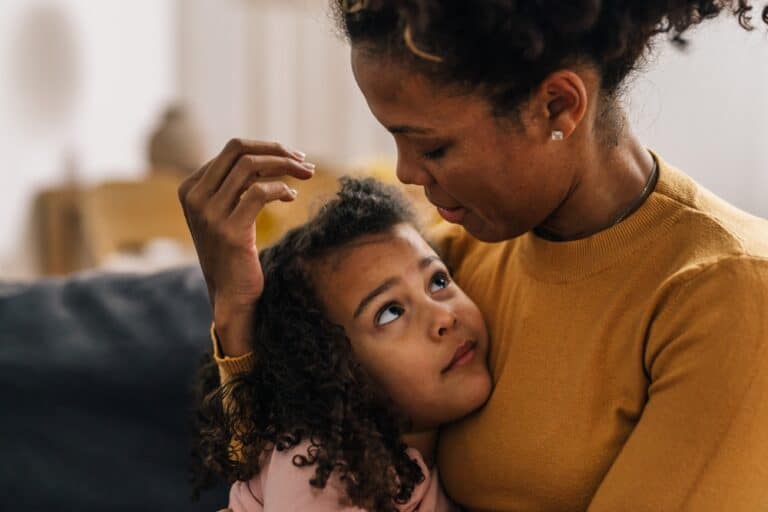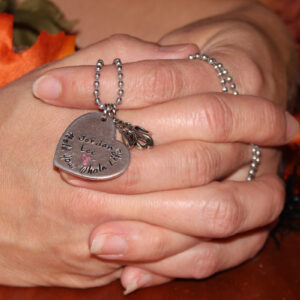Looking up from my neat pile of clothing and surveying the once Mt. Everest of clean clothing that was now almost gone, I became acutely aware of how quiet the house had become. Any veteran mom knows that silence is the siren call of danger. It didn’t take much to pull me away from the tedious task of folding laundry.
As I began to make my way to the playroom. I stopped. Frozen in my tracks. I stood there in shock as I took in what I was seeing. Baby powder. From floor to ceiling. It covered the room, including my children.
A rush of anger flooded my chest. My emotions took over. I lectured, yelled, and complained to my 7-, 5-, and 3-year-olds. I told them what they’d done was wrong, wrong, wrong.
Something about their powder-covered faces and wide eyes brought the steam engine of emotions to a halt. A question popped into my mind. Is this the mother I wanted to be? Like magic, my anger vanished, and I was left with a sense of humor and awe as I re-evaluated the situation. What once was too much became too funny.
I grabbed my camera and documented what has now been coined the Great Baby Powder Blizzard of 2006. This experience set me on a path of discovery to uncover parenting techniques that would help me transform into the mother I wanted to be as well as set me on a new career path. I have found a whole new world of emotions and how they can run us ragged or set us free, and what’s crazy about it all—it’s all optional.
There are so many feelings about feelings. We have good feelings and bad feelings. Positive feelings and negative feelings. Feelings we chase after and feelings we avoid like the plague. Try as you might, there’s no avoiding negative emotions. Life’s full of them. No human escapes life without feeling the emotional wave of negative emotions.
The lie you’ve been taught is that negative emotions are “bad” and positive emotions are “good.” That belief has caused more pain than the sensation of feeling a negative emotion. It disempowers you as a parent, triggers your nervous system, and puts you in a state of judgment and confusion. None of this will create the trusting relationship, connection, and peace you are longing for as a parent. If you want to stay calm, connected, and confident no matter what your kids are doing . . . build strong relationships with your kids that last . . . and enjoy parenting now, you’ll have to change your opinion and relationship with emotions.
There are three emotions that are critical to become comfortable with when you’re first getting started doing the work to become what I call a connect method parent.
RELATED: Teaching My Child To Deal With Big Emotions Starts With Me
Frustration
Let’s start with frustration. The kids start fighting in the other room, you can feel the heat of frustration start to rise up to your chest. You can handle it for 30 seconds, but then your body starts screaming at you. It hates the way frustration feels. Your subconscious brain thinks the kids fighting is causing the frustration. Using the assumption it populates a solution. End the fighting at all costs.
Filled with frustration you lunge into action with a singular motivation. Stop the fight so you can stop the frustration. Your child is on fire with fowl frustration toward his sister, you are filled with frustration toward the situation, and without realizing it you pour gasoline on the already raging fire, making things worse not better.
How did you get yourself into such a predicament? It was your inability to feel the emotion of frustration without acting on the emotion of frustration.
Let’s rewind the situation. What if the frustration you felt after hearing the kids fighting in the other room didn’t send you into urgent action to stop the fighting? What if instead, it sent you into compassionate curiosity for your struggling children in the other room? You would stay level-headed, calm, and connected to your highest self and thinking as you moved toward helping your children navigate a situation that they were unable to navigate on their own.
Accepting and acknowledging that frustration is present will paradoxically reduce frustration and allow your brain to shift and get curious as to why they aren’t listening. This will then allow you to help your children instead of trying to fix them. When your children are no longer problems to be fixed, but rather people to be understood, frustration begins to dissipate.
How is that possible you wonder? Let me tell you a secret. All feelings stem from your thoughts! That’s it. When you start to think differently about a situation, you can show up differently in that situation. Learning how to regulate your emotions models to your children how to model theirs. Learning to catch your feelings before they take over requires that you go through the messy process of practicing, failing, and trying again. It demands that you learn to give yourself lots of space and grace. This leads me to the next feeling that brings a lot of discomfort.
Success
Believe it or not, a lot of us feel really uncomfortable with acknowledging how downright awesome we are. Our brains have so much resistance to the idea that we are, at our core, loveable and capable. Most days our brains are so focused on what isn’t working instead of seeing what is.
Sitting in our success and celebrating our wins can feel very unnatural. However, it’s a huge part of the journey to becoming a connected parent. Numerous clients I have worked with have struggled with this concept, and they would frequently beat themselves up whenever they made a mistake. Only when we start to love ourselves through our mistakes and recognize the small wins, will we start to create lasting change.
Grief
Change is constant and is one of the leading causes of grief, the last emotion we are going to discuss here. As parents, we have hopes and dreams for our children’s futures and sometimes they aren’t realized because our kids make choices that don’t align with our dreams for them. The disappointment of unmet expectations can lead to people avoiding their grief.
RELATED: Strong Moms Cry, Too
Getting familiar with and welcoming grief helps us come to accept what is. Because it is what is. When we resist what is, it can create a lot of suffering for us. Accepting what is frees our minds and hearts to grieve. Truth is, we can only control ourselves. Allowing ourselves to welcome grief and process it, as uncomfortable as it is, may open the door to new possibilities.
But how do you take control of these emotions? The first step is to get curious about them. Some questions I like to ask myself to get curious are I wonder what’s going on for me right now? or How do I want to handle this emotion? These questions help me put on the brakes and take back the proverbial wheel of my choices.
Questions are a powerful tool that can lead to new thoughts about emotions. The advice I give to my clients is to take time to write their thoughts about a specific emotion. One client did this with anger. Through this exercise, she realized she believed anger was necessary when setting limits with her kid. Once she took the time to recognize her current belief, she could then choose to think about the situation differently. She shared how seeing her emotions allowed her to talk and think differently about them and in turn could act in a new way.
Frustration, success, and grief are huge parts of the human experience as are love, gratitude, and acceptance. All of them are normal and optional. We always get to choose how we respond to what happens around us. Sometimes we may want to feel grief about a situation or we may want to sit in the grief and marinate in it. It’s our choice.
Recognizing that our emotions are choices helps us take control of our lives instead of being victims to them. What’s so fascinating is that all these different feelings create sensations in our bodies. Some feel amazing and others feel terrible. Feeling them all and getting comfortable with the discomfort is the doorway to feeling better. So let’s get uncomfortable, recognize it, make a decision about it, and then show up from a place of power and confidence instead of fear and anxiety.

If you liked this, you'll love our book, SO GOD MADE A MOTHER available now!
Order NowCheck out our new Keepsake Companion Journal that pairs with our So God Made a Mother book!
Order Now


















